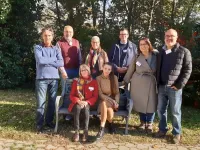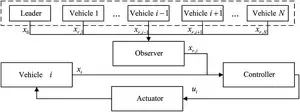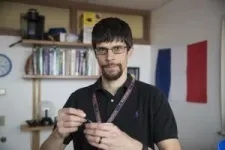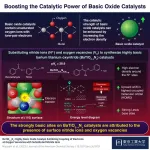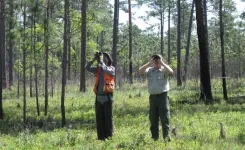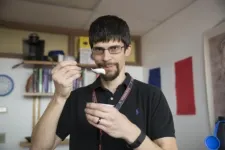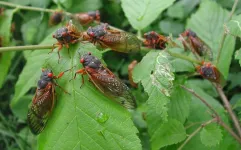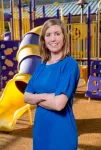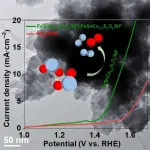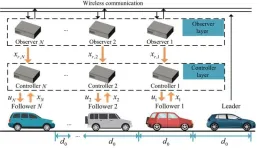(Press-News.org) COSPAR and the Erasmus+ Education Programme
COSPAR’s participation in Erasmus+ programmes is part of the COSPAR Panel on Education’s new approach to its mission of developing “means and media to encourage and spread space-related education”. The StudenTs As plaNetary Defenders (StAnD) project aims to engage primary and secondary school students in the subject of asteroids, meteors, and planetary defence.
The 36-month StudenTs As plaNetary Defenders (StAnD) programme brings asteroids, comets, meteors and meteorites to the classroom using carefully prepared activities and experiments. The programme includes the installation of meteor detection cameras in participating schools and a specially designed kit for micrometeorite hunting. The partners involved have joined their expertise to design an integrated approach that will enable students to follow the journey of these cosmic visitors from the depths of space to our planet. StAnD will introduce a new trend of activities engaging students in their STEM (science, technology, engineering, and mathematics) curriculum and enhancing their interest in these fields.
The activities involved in the project also have the considerable potential of leading to new original scientific discoveries, such as the discovery of new asteroids and meteorite falls. Their teachers will receive training and support via massive open online courses and summer schools to prepare topics related to astronomy, the solar system, and space exploration. The teachers will make use of selected online resources to better present the contents to the students and will acquire innovative student-centred methodologies that facilitate the integration of digital content into the STEM curriculum. They will also receive training on how to use robotic telescopes and the relevant software to plan the observations, as well as how to operate and interpret the meteor images acquired by the camera systems. They will learn how to collect and identify the micrometeorite samples. The results of various phases of the project will be continuously disseminated, spreading the results among the participants, countries, at European and international level.
StAnD will be coordinated by the Istituto Nazionale di Astrofisica (INAF), Italy, with the active participation of COSPAR, France, NUCLIO, Portugal, Ellinogermaniki Agogi, Greece, and FTP-Europlanet, Germany.
At the heart of the COSPAR Panel on Education’s new initiatives is a move to enhance the professional development of educators. Efforts to bring space research to educators and trainers will be stepped up, by expanding the existing teacher-training programme during the biennial COSPAR Scientific Assemblies, by including this opportunity in the COSPAR Symposia, held in alternate years to the Assembly, and by forming partnerships with organisations such as the International Astronomical Union (IAU) and the Global HandsOn Universe (G-HOU). StAnD is the second Erasmus+ project COSPAR is involved with, following close on the heels of the EXpeditionary Program for Learning OppoRtunities in Analog Space Exploration (EXPLORE) programme.
The COSPAR President, Professor Pascale Ehrenfreund said: “Learning about space can capture the imagination of students, leading to increased interest in Science, Technology, Engineering, and Mathematics (STEM) subjects. This can foster a future workforce skilled in these critical areas. COSPAR is therefore engaging with teachers and educators worldwide to increase and sustain interest in STEM subjects and to encourage more young people to take up STEM careers to enter the space sector. I strongly believe we can make a difference and I look forward to following the progress of these Erasmus+ projects and to welcoming these students into the COSPAR community.”
The Executive Director of COSPAR, Dr Jean-Claude Worms, stated: “COSPAR places great emphasis on educating new generations of school and university students in the space science areas, by supporting teachers through specific training programmes during COSPAR events, and by providing appropriate means to its Panel on Education. Our recent involvement with several dedicated partners in ERASMUS+ programmes is another step in that direction.”
Chair of COSPAR’s Panel on Education, Dr Rosa Doran, said: “I am a believer in the empowerment of educators to bring the new generation closer to their future careers. Bringing authentic research experience to students. These young people will develop with a different mindset towards innovation, with a better understanding of the scientific method and with a good starting point on the construction of their science capital. The Panel of Education of COSPAR has the ambition to be the facilitator of such possibilities and to bring the worlds of research and education closer."
Background
The COSPAR activity that is particularly relevant to this ERASMUS+ project is developed by the Panel on Education. The COSPAR Panel on Education, under the dynamic Chair Rosa Doran, aims to adopt a more active approach towards its growth and impact within COSPAR, to broaden its target audience from educators to a whole-school approach, involving all members of the schools and their local communities, to reach out to policy makers and to guarantee a deeper involvement of its members towards a common goal: generating greater awareness of the importance of space science and how it is already impacting society.
The Panel on Education works on the development of means and appropriate media for encouraging and spreading space-related education. It works with COSPAR Scientific Commission Chairs, Panels, and other interested parties to identify the audience to whom the outreach and education is aimed, whether primary and secondary schools, universities, the general public via journalistic media, students, and especially underprivileged students in countries where space-related activities do not exist.
The Panel seeks to identify how to make educational tools and media available, and it explores possible links to and interactions with already established educational programs on topics related to research areas covered by COSPAR. The Panel also establishes links and strategic partnerships and alliances, for example with UNESCO, so that its activities can be supported without unnecessary duplication. The four Officers in charge of this Panel, and the very large body of volunteers (both teachers and scientists) working to support its activities and events have extensive experience of developing international educational projects, including EU-funded programmes, in particular ERASMUS+.
StAnD Key Facts
What? Students As planetary Defenders (StAnD) aims to engage primary and secondary school students and teachers in the subject of asteroids, meteors, and planetary defence, raising interest in science and space exploration, and improving their skills in science, technology, engineering and mathematics (STEM) subjects. Students will have the opportunity to discover new asteroids in telescopic images obtained in Hawaii, USA, and study in more detail the properties of known asteroids and comets using robotic telescopes in observatories around the world. They will learn how to use new technologies, will improve their digital skills, and will work as teams in the different campaigns during the project.
Why? Several growing needs in education are targeted in StAnD. The project is designed to raise interest and awareness of the importance of STEM fields among young students; to upgrade educators’ skills and learning in various fields; to improve educators’ and learners’ digital literacy; and to bridge the digital divide, ensuring an inclusive environment. These are crucial areas for the future needs of society. Trained teachers will become better prepared for addressing STEM topics, leading to improved learning by the students. The activities will engage students and teachers and lead to potential scientific discoveries.
Who? The Istituto Nazionale di Astrofisica (INAF) is coordinating the project, leading the partnership of COSPAR, NUCLIO, Ellinogermaniki Agogi and FTP-Europlanet.
For whom? A minimum of 50 schools will be involved, reaching 135 educators and 1,500 students. The main target groups are schools, scientists, and other relevant stakeholders in the field of education.
How? Meteor detection cameras will be installed in each of the participating schools and students will operate them, with support from project members. These cameras will detect meteors that enter the Earth’s atmosphere and may register a meteor large enough to leave a remnant in the ground—a meteorite—that can be recovered by specialists, and possibly the re-entry of man-made objects. Students will also have the opportunity to recover micrometeorites, microscopic fragments of asteroids and comets, by using the Stardust Hunter kit that will be developed by the project team. The project will include: -
Teacher training sessions through massive open online courses (MOOC) and two summer schools;
Installation and operation of meteor detection cameras in participating schools;
Micrometeorite collection using the detection kits;
Asteroid Search Campaigns using professional telescopes in Hawaii on the framework of the International Astronomical Search Collaboration; and
Asteroid follow-up observations using the Las Cumbres Global Observatory telescopes.
Where? Initially in schools in Germany, Greece, Italy and Portugal, and it is hoped to mainstream the methodology being piloted in this project to other schools at a global level.
Duration? 36 months; starting 1 September 2023
Issued by: COSPAR Communications, Ms Leigh FERGUS; leigh.fergus@cosparhq.cnes.fr https://cosparhq.cnes.fr/
Note to Editors
COSPAR, the Committee on Space Research, was created in 1958, at the dawn of the space age, under the aegis of the International Council of Scientific Unions, now the International Science Council (ISC). COSPAR’s objectives are to promote on an international level scientific research in space, with emphasis on the exchange of results, information and opinions, and to provide a forum, open to all scientists, for the discussion of problems affecting space research. In its first years of existence as an entity that ignores political considerations and views all questions solely from the scientific standpoint, COSPAR played an important role as an open bridge between East and West for cooperation in space. When this role became less prominent with the end of the Cold War, COSPAR focused its objectives on the progress of all kinds of research carried out with the use of space means. COSPAR has played a central role in the development of new space disciplines such as life sciences and fundamental physics in space, by facilitating the interaction between scientists in emerging space fields and senior space researchers. Another recent inclusion in our portfolio concerns social sciences and humanities, which aims to provide opportunities for COSPAR to engage with SSH communities, including in the education area, and gives a role to our organization that is commensurate with today’s interaction of space matters with the broader society.
A recent emphasis is the development of tighter bonds between science and industry, through the establishment of the Committee on Industry Relations, grouping 18 major aerospace companies worldwide, and advising COSPAR on how best to integrate the capabilities of industry into COSPAR’s activities and by doing so, to best serve the interests of industry and science in a synergistic way.
COSPAR strives to promote the use of space science for the benefit of humanity and for its adoption by developing countries and new space-faring nations, in particular through a series of Capacity Building Workshops which teach very practical skills enabling researchers to participate in international space research programs. COSPAR advises, as required, the United Nations and other intergovernmental organizations on space research matters and on the assessment of scientific issues in which space can play a role, for example the Group on Earth Observations (GEO), in which COSPAR is a Participating Organization. COSPAR is also the key entity worldwide in terms of developing, maintaining and promulgating clearly delineated policies and requirements as to the standards that must be achieved to protect against the harmful effects of biological interchange in the conduct of solar system exploration and use.
COSPAR Social Media:
LinkedIn: Committee on Space Research - COSPAR
Facebook: Committee on Space Research
X: @CosparHQ
YouTube channel: @COSPAR
Instagram: @CosparHQ
Mastodon: @astrodon.social cosparhq
About Erasmus+
Erasmus+ is the EU’s programme to support education, training, youth and sport in Europe. It has an estimated budget of €26.2 billion. This is nearly double the funding compared to its predecessor programme (2014-2020). The 2021-2027 programme places a strong focus on social inclusion, the green and digital transitions, and promoting young people’s participation in democratic life. It supports priorities and activities set out in the European Education Area, Digital Education Action Plan and the European Skills Agenda. The programme also supports the European Pillar of Social Rights; implements the EU Youth Strategy 2019-2027; and develops the European dimension in sport. Funded by the European Union. Views and opinions expressed are however those of the author(s) only and do not necessarily reflect those of the European Union or the European Education and Culture Executive Agency (EACEA). Neither the European Union nor EACEA can be held responsible for them.
About the Istituto Nazionale di Astrofisica (INAF)
The Italian National Institute for Astrophysics is the main Italian research institute for the study of the Universe. INAF promotes the enhancement of the research results conducted or coordinated by its astronomers. Besides research in astronomy and astrophysics, INAF is very active in education towards students in schools and society through dissemination, educational and outreach activities. These activities are carried out by the 16 research facilities spread all over the country. INAF– Osservatorio Astrofisico di Torino, the leading partner of StAnD, is one of the most important research institutes in Piedmont (NW Italy) and its history dates back to the mid-18th century. Currently more than 100 people (including researchers, technician, administration, students) collaborate with the Observatory activities. For more information, visit www.inaf.it
About NUCLIO
NUCLIO is a non-profit association and an NGO for development created in 2001 that focuses on the promotion of innovation for a better future. The team is composed of a group of scientists, teachers, and researchers devoted to innovation in education, science education, psychology of education and science outreach. The work done by the team in the field on innovation in education includes the promotion of student-centred approaches, STEAM learning, Maker skills and the Digital transition, Democracy and participatory activities, Inclusion and Diversity, Design Thinking, Scientific Research in the Classroom, Open Schooling and Innovative student Assessment (among others). An official training centre recognised by the Portuguese Ministry of Education, NUCLIO is also the coordinator of the Galileo Teacher Training Program, one of the largest astronomy education efforts in the world, the Galileo Teacher Training Program, endorsed by the International Astronomical Union and UNESCO. The program has already reached over 50,000 teachers from over 120 nations. NUCLIO is the coordinator of the Portuguese Language Expertise Centre for the International Astronomical Union (PLOAD) where, and among other roles, has the responsibility of bringing innovation and capacity building to Portuguese speaking nations and communities across the world. http://nuclio.org
About Ellinogermaniki Agogi
Ellinogermaniki Agogi (EA) is one of the most innovative schools in Europe. It has 2500 students (ages 5 to 18 years old) and 250 teachers in different disciplines. EA has a very strong vision-generated interest and rich research and development activity in the fields of Inquiry Based Science Education (IBSE), Project Based Learning (PBL), and STEM education in combination with digital, online based learning environments and tools that use virtual reality, augmented reality and story-based education. EA is continuously modernizing STEM education by promoting and creating user-driven learning environments for students and offering numerous opportunities for teachers’ professional development to be prepared and thrive in the landscape of unprecedented challenges and opportunities in the 21st century. www.ea.gr About FTP-Europlanet Founded in 2021, and located in Weinheim, Germany, FTP-Europlanet gUG builds on the heritage of the Faulkes Telescope Project (FTP), established in 2004 to bring the excitement of observing with research-grade telescopes into classrooms. Through an MoU with the Europlanet Executive Board, FTP-Europlanet gUG draws on the 18 years’ experience of Europlanet in delivering media, communications and education activities and training for the European planetary community, with a particular emphasis on supporting early career researchers to develop skills for their future careers. https://ftp-europlanet.de/welcome-to-ftp-europlanet
END
Bringing asteroids to class: COSPAR joins new Erasmus+ program
2023-11-30
ELSE PRESS RELEASES FROM THIS DATE:
Developing a superbase-comparable BaTiO3−xNy oxynitride catalyst
2023-11-30
Basic oxide catalysts contain oxygen ions with unpaired electrons that can be shared with other species to facilitate a chemical reaction. These catalysts are widely used in the synthesis of chemicals, pharmaceuticals, and petrochemicals. There have been efforts to improve the catalytic power of these catalysts by improving their basicity or the ability to donate electrons or accept hydrogen ions. Various strategies include doping the catalyst with highly electronegative cations such as alkali metals, substituting oxide ions ...
Hurricanes boost cone production in longleaf pine
2023-11-30
New research on tree reproduction is helping solve a puzzle that has stumped tree scientists for decades. Many tree species exhibit a reproductive phenomenon known as “masting”, where individual trees have very low seed production in most years followed by a sudden burst of seed production that is synchronized over large parts of its range. The reason for this coordinated reproduction within a species is unclear.
A new study by scientists at The Jones Center at Ichauway and the USDA Forest Service Southern Research Station showed ...
Scientists uncover how fermented-food bacteria can guard against depression, anxiety
2023-11-30
University of Virginia School of Medicine researchers have discovered how Lactobacillus, a bacterium found in fermented foods and yogurt, helps the body manage stress and may help prevent depression and anxiety. The findings open the door to new therapies to treat anxiety, depression and other mental-health conditions.
The new research from UVA’s Alban Gaultier, Ph.D., and collaborators is notable because it pinpoints the role of Lactobacillus, separating it out from all the other microorganisms that naturally live in and on our bodies. These organisms are collectively known as the microbiota, and scientists have increasingly ...
Broadband buzz: Periodical cicadas' chorus measured with fiber optic cables
2023-11-30
Annapolis, MD; November 30, 2023—Hung from a common utility pole, a fiber optic cable—the kind bringing high-speed internet to more and more American households—can be turned into a sensor to detect temperature changes, vibrations, and even sound, through an emerging technology called distributed fiber optic sensing.
However, as NEC Labs America photonics researcher Sarper Ozharar, Ph.D., explains, acoustic sensing in fiber optic cables "is limited to only nearby sound sources or very loud events, such as emergency vehicles, car alarms, or cicada emergences."
Cicadas? Indeed, periodical cicadas—the ...
More than $13M awarded to study childhood obesity interventions in rural and minority communities in Louisiana and Tennessee
2023-11-30
BATON ROUGE – Pennington Biomedical Research Center and Vanderbilt University Medical Center have received $13.8 million for five years of research funding from the Patient-Centered Outcomes Research Institute to study the ideal “dose” of behavioral interventions to treat childhood obesity in rural and minority communities across Louisiana and Tennessee.
Pennington Biomedical’s Amanda Staiano and Vanderbilt University Medical Center’s Bill Heerman are co-principal investigators on the randomized, multisite trial.
Despite ongoing efforts, childhood obesity rates have continued to increase over the ...
Decoding past climates through dripstones
2023-11-30
“Dripstones, or speleothems, are unique natural archives - like Earth’s USB sticks. They store a wealth of information on past climate which helps us to better understand the environment in which early humans lived”, Jenny Maccali explains. She is a scientist at SapienCE Centre of Excellence, and has has lead the study, now published in Climate of the Past.
New perspective to ancient climate
South Africa has a highly dynamic climate resulting from its position at the convergence of two oceanic basins, the Atlantic Ocean to the west and the Indian Ocean to the east. ...
Lower voltage and reduced carbon input for cleaner energy in the works
2023-11-30
There is an ever-present struggle to reduce carbon-based energy sources and replace them with low or no-carbon alternatives. The process of splitting water could be the resolution.
Hydrogen production is a simple, safe, and effective method to produce more energy than gasoline can by the simple process of splitting water. Harvesting energy this way as opposed to relying heavily (or at all) on carbon-based energy sources is increasingly becoming the standard. Researchers have found a method to use transition metal ...
Platoon control of connected vehicles with heterogeneous model structures considering external disturbances
2023-11-30
A paper describing the distributed cooperative control problem with the heterogeneous model structures and external disturbances for the connected vehicle (CV) platoon was published in the journal Green Energy and Intelligent Transportation on November 25th, 2022.
In recent decades, the cooperative control problems of CV platoon on highways have attracted widespread interest for their significant impact on road transportation. The platoon control of CV has the advantages of improving the safety of highways, increasing the ...
NCCN and SLACOM host international symposium to improve breast cancer care in Latin America
2023-11-30
BUENOS AIRES, ARGENTINA & PLYMOUTH MEETING, UNITED STATES [November 30, 2023] — Today the Latin American and Caribbean Society of Medical Oncology (SLACOM) and National Comprehensive Cancer Network® (NCCN®) host the Latin American Regional Breast Cancer Summit: Advocating and Implementing Guideline-Concordant Cancer Care for Patients. Esteemed experts from Argentina, Brazil, Mexico, Columbia, Peru, and the United States will present challenges, barriers, and potential solutions for improving access to guideline-concordant breast cancer care in the Latin American region. The regional summit provides an opportunity for a diverse group ...
Innovative gel offers new hope for treating gastrointestinal leaks
2023-11-30
In a major advancement in medical technology, researchers at the Terasaki Institute for Biomedical Innovation have developed an adhesive gel, offering a revolutionary treatment for gastrointestinal leaks, a condition clinically known as enterocutaneous fistulas. This development marks a significant milestone in addressing a challenging medical condition that has long plagued patients and clinicians.
Enterocutaneous fistulas, which are abnormal connections between the gastrointestinal tract and the skin, are primarily a ...
